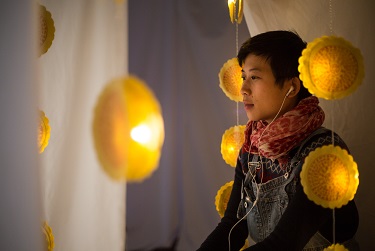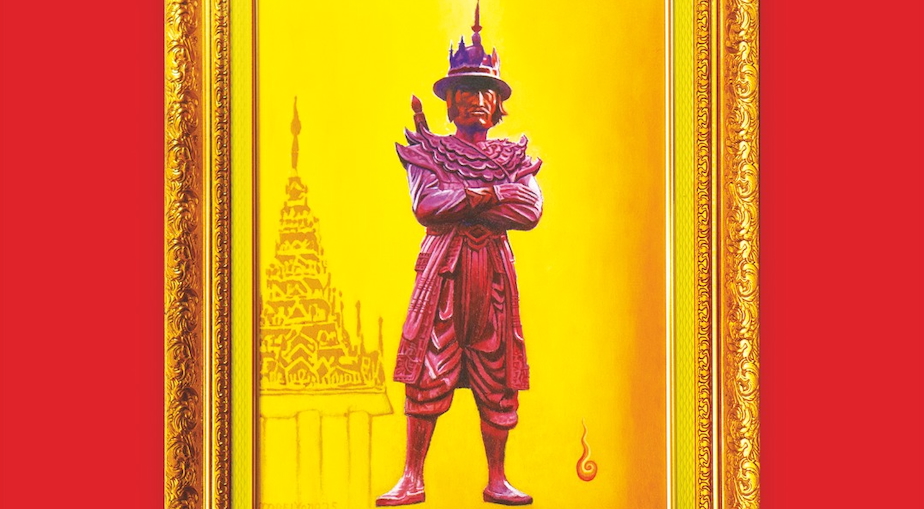Essays and Fiction is a new series of writing in Inside Indonesia that aims to give voice to more personal stories about Indonesia. We welcome submissions in the form of reflective pieces, fiction, artwork, or essays about travel and fieldwork experiences.
Rani Pramesti
Pramesti's Chinese Whispers
I was twelve years old when the May Riots of 1998 ravaged Jakarta, my city of birth. I recall climbing to the top of the water tower on the roof of my house and watching as large plumes of smoke climbed their way to the sky from different points in the city.
At that time the stories that floated to my ears were those of brutal sexual violence enacted upon women and girls who looked like me. That was when I realised for the first time in my life, that in the eyes of many, I was not Indonesian, but rather, Chinese.
What is Chinese Whispers?
My name is Rani Pramesti. I am an actor and a performance maker based in Melbourne, Australia.
My current creative project, Chinese Whispers, is an installation-based performance. My creative team and I are building a maze that audiences will enter in pairs, wearing headphones.
 Through these headphones, they will come to hear the interviews that I have conducted with predominantly Chinese-Indonesian women from all walks of life, as I try to answer the question, ‘How does racial violence happen?’
Through these headphones, they will come to hear the interviews that I have conducted with predominantly Chinese-Indonesian women from all walks of life, as I try to answer the question, ‘How does racial violence happen?’
Inside each room of the maze, there are objects for the audience to play with, to touch, to explore, as they navigate their way down dreamlike corridors.
Newspaper clippings of the May Riots folded into elegant origami pieces; a forest of green foliage to comfort you as you listen to at times devastating detail about the violence; and a warm cup of tea to share with Fanny, our resident actor, who will greet you when you emerge from the maze.
Why the May Riots of 1998?
Chinese Whispers takes a particular view of the riots, which occurred in Jakarta, Solo, Surabaya and other cities across Indonesia from 12-14 May. Chinese-Indonesian owned property was destroyed, Chinese-Indonesian women were sexually assaulted and raped, and hundreds of urban poor were killed in fires set alight in shopping malls at the height of the rioting.
I did not intend to create this work. In 2013, when the seeds of Chinese Whispers began to grow, I thought that I was on the way to making a fairly conventional theatrical play. I began running theatre workshops with Chinese-Indonesian women with the intention to tell the story of our identity and our migration to Australia.
I wanted to steer clear of any real delving into the May Riots. This reluctance to look at these violent events came from the fact that the perpetrators of violence and the masterminds of the riots continue to enjoy full impunity to this day.
During some of my interviews, women who spoke at a normal volume when we were discussing their daily lives, their church communities here in Australia and so on, would suddenly drop their voices when we spoke about the May Riots. They would not notice that they had done so until I drew attention to it.
What is behind that sudden whispering? What do they fear? The fear of being overheard talking about this? The fear of saying something wrong? The fear of wanting to know about what happened?
My hope is that Chinese Whispers will contribute to a long-term journey of opening up these conversations about race, violence and ‘the dark spots in our history’, as one interviewee, Dewi Anggraeni called it. These conversations are necessary in order for us to continue to grow as a society in Indonesia, in Australia and elsewhere.
Why a maze?
Earlier this year, I took some time to reflect on the journey that I had started through the making of Chinese Whispers. It struck me that the search for finding out who I was – was I Chinese or Indonesian? Or neither? Or both? – and finding out what this performance was very much like entering into a maze.
I had no idea who or what I would encounter next - what I would come to see, what I would come to hear. In other words it was blind corner after blind corner, and yet I pressed on.
Chinese Whispers asks you to stay with the discomfort of not knowing and thereby, begin the process of ‘dismantling the frame’ of our own ignorance.
Rani Pramesti (www.ranip.com.au; www.facebook.com/ChineseWhispers2014) is an actor and theater maker. Chinese Whispers is showing in the Melbourne Fringe Festival, 23-28 September 2014, Bluestone Church Art Space, 8 Hyde St, corner Napier Street, Footscray, Victoria. See the trailer for Chinese Whispers here. See Rani’s artistic statement for Chinese Whispers here.
Other related articles from the II archive
'Chinese Indonesians ten years after reformasi', Michele Ford and Jemma Purdey 'A common destiny', Jemma Purdey 'Outbreak of rioting: Tinderbox of conspiracy', Gerry van Klinken












